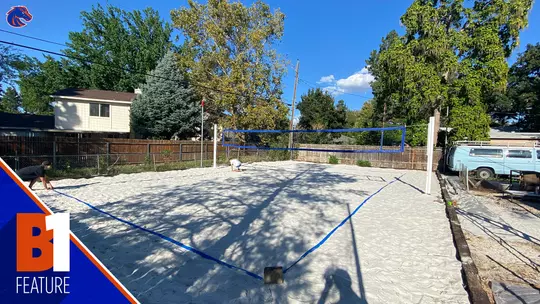
A Boise Backyard Oasis
Nick Gruber
Idaho doesn’t exactly read like a beach volleyball destination. Four million acres of wilderness, winters that stack up snow, and a city nearly 3,000 feet above sea level don’t suggest much sand. Yet Boise State coach Alex Venardos has spent the past decade proving the sport belongs here.
He even built a regulation court in his own backyard to show it.
?? ?????? ?????? of Boise State Beach Volleyball.
— Boise State Beach Volleyball (@BroncoSportsBVB) July 17, 2025
Alex Venardos has been elevated to the head coaching role ??
??: https://t.co/e7zlCu0Qjq#BleedBlue | #WhatsNext pic.twitter.com/y6WlTMkjfr
Venardos came to the Treasure Valley from Manhattan Beach, California, in 2015 as an undergraduate student. While working toward his degree, he served as a practice player and volunteer assistant coach for both the beach and indoor volleyball teams.
After graduation, he joined the beach program in a full-time role as an assistant coach. Nearly six years later, he was promoted to head coach on July 17, 2025. Between his time as assistant and head coach, he helped Boise State reach 20 wins for the first time in program history, earn multiple ranked victories, set a program-record 31 wins in 2024, and make its first NCAA National Championship appearance in 2025.
Outside the college game, Venardos has been just as important in shaping the sport locally. Before he arrived in Boise, there was no organized beach volleyball beyond the occasional Boise Parks and Rec offerings.
I used to look around and be really frustrated that there weren’t people taking it as seriously or at a competitive and high level. I realized I could either be frustrated and just deal with it, or I could take people in and try to give as many opportunities and invest long term into the sport and the athletes.Alex Venardos
What was once difficult to find four people for a game has turned into three full courts at the Boise State complex on most nights, a direct result of Venardos’ commitment and the creation of Idaho Beach, the only junior and adult beach volleyball club in the state.
The club has opened doors for newcomers picking up the sport for the first time, while also helping develop junior athletes into Division I players. Many of the coaches he brought in are former Boise State beach athletes, a reflection of the relationships he’s built and the standard of coaching he maintains.
Despite all the growth, the wins, the program milestones and the expansion of the sport across the Treasure Valley, one of his most meaningful moments happened in his own backyard.
The day he finished a two-year project to build a beach volleyball court from scratch.
“I remember the first day we got to play. I don’t cry a lot, but that was definitely a moment that I felt emotional. It was a long time coming.”Alex Venardos
THE COURT
In 2019, Venardos began his search for a property to call home. When most people build a list of criteria, they focus on bedrooms, bathrooms, garage size and layout. Though those factors mattered, one requirement sat at the top of his list: a backyard big enough for a beach volleyball court.
“The inspiration came from a lot of years of traveling around the U.S. and seeing other people’s home courts and realizing the kind of community you could build around them,” Venardos said. “I wanted to have a place where people had fun learning and being around other people with the sport.”
His original plan was to find a plot of land near Lucky Peak, but as a Boise State and junior-level coach, the logistics didn’t make sense. He needed a more central location. After two years of searching, he finally found the right property in 2021.
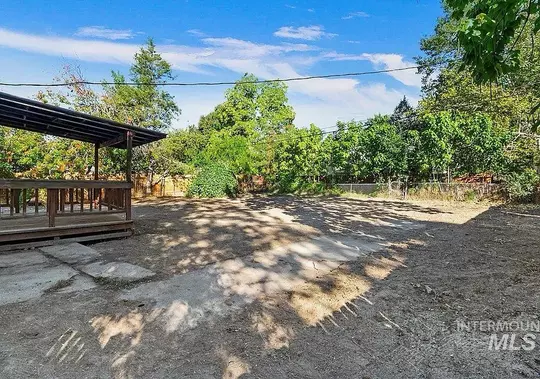
And while he could picture the court in the yard, the process became far more demanding than he expected.
“I started to build right away, but grossly underestimated the amount of work that it took to get it done,” Venardos said. “The removal of dirt took a lot longer than I thought it would. I didn’t have a medium to get the dirt anywhere.”
That’s where the beach community he helped develop stepped in. One of his close friends, former Boise State All-American, Hall of Famer, and national champion wrestler Kirk White, came to help. Now a contractor in the Boise area, White had access to dump trucks and his own bulldozer. As he took on local projects needing fill, he hauled away dirt from Venardos’ backyard, one load at a time.
“He would come at any hour of the day or night, literally any hour, and start hauling the dirt one truckload at a time,” Venardos said.
As the dirt slowly disappeared, Venardos recruited dozens of his volleyball friends to help keep the project moving. They added gravel for drainage, set the poles for the net, flattened the surface, framed the court with railroad ties, and lined the entire base with fabric.
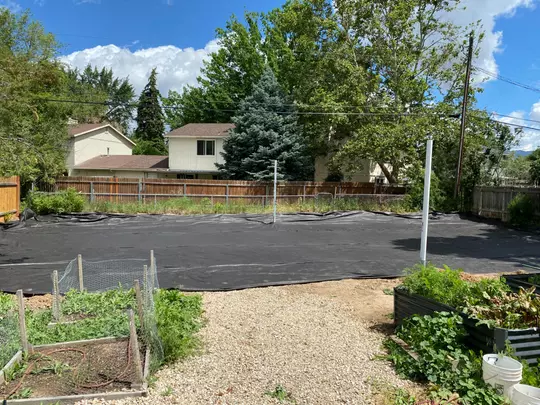
The last step was bringing in the sand.
“We brought it in on these massive dump trucks that have conveyor belts that open from the back and launch the sand like a snow machine,” Venardos said. “We had to take part of the fence down so the truck could get far enough.”
Once the sand was spread and the surface leveled, the court was ready. And it wasn’t built just for him, it was built for everyone.
“The courts at Boise State were pretty much the only decent beach volleyball courts in the area,” Venardos said. “With adult leagues, juniors, and Boise State camps, I felt like I was kind of gatekeeping a lot of access to the sport. My court is an open invite now to anybody who has my contact information. I always give them the green light to reach out and see if anybody’s using the court, even if I’m not home, even if my girlfriend’s asleep, whatever.”
Two years of work ended with a first serve, a full-circle moment for him.
“I remember the first day we got to play,” Venardos said. “I don’t cry a lot, but that was definitely a moment I felt emotional. It was a long time coming.”
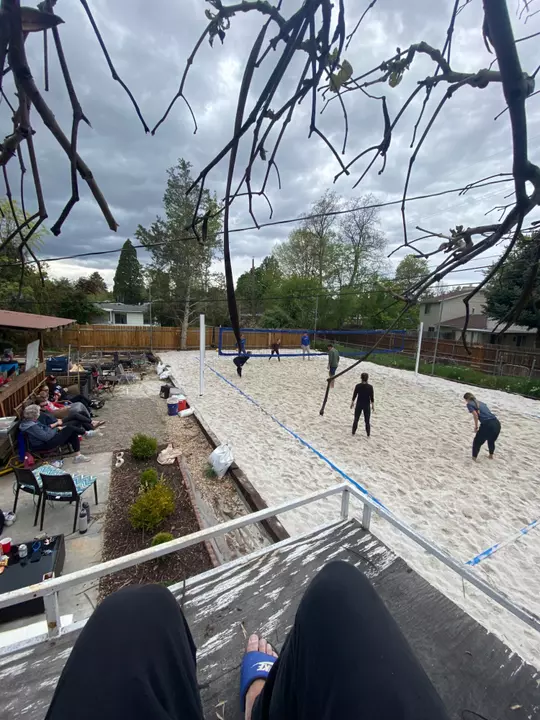
GROWING THE GAME
Having a backyard court isn’t just about personal space; it’s a symbol of the growth of beach volleyball in Boise. High-quality courts in the area are limited, and access can be a barrier for juniors, adults, and athletes. By opening his backyard, Venardos added another place to train and connect with the sport.
“Alex has done more for beach volleyball in this community than anyone else I know,” said Kekoa Nawahine, former Boise State football player and avid beach volleyball player. “If Alex is playing or putting something on, odds are high it’ll be a good turnout. His backyard court is legit. He's put some time and money into his deck and garden area to make it a perfect spot for people to get together, get some good games in, and have a good time. I can’t say enough good things about Alex, he is just a solid dude.”
The space turned into exactly what Venardos hoped it would be – a place where people could gather, learn and play. Friends, players and local volleyball community members were there throughout the build, and many of them remain part of the regular rhythm of the court today. His drive to continue to support the beach volleyball community is evident now in the court’s second full year of action.
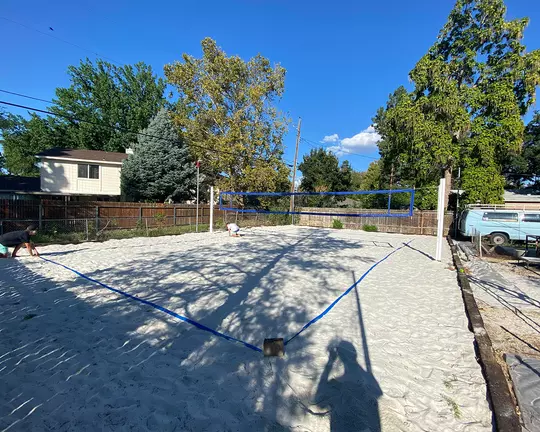
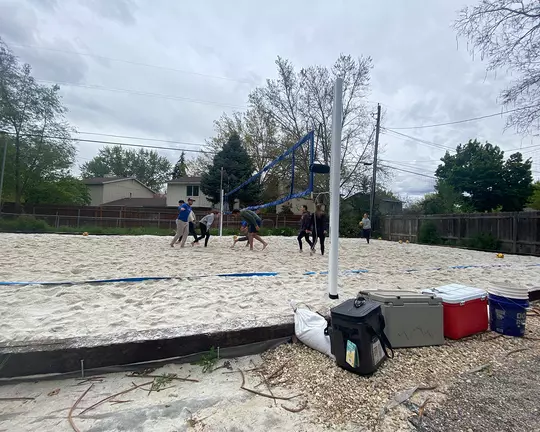
“I’ve turned the whole backyard area into more of a hangout spot,” Venardos said. “We put in a big covered deck with a couch in front and bar top overhead, mini fridges, a grill, a couple more couches, and even an old camper van that has a platform on top for viewing. A lot of times when people are over playing, there’s also five to ten people just hanging out.”
Venardos even added a garden, giving visitors the chance to take produce whenever they want.
Though his friends haven’t built their own courts, Venardos has used his knowledge to help others. He has served as an advisor for the College of Idaho on court construction and offers advice to anyone trying to build their own through a Facebook group for court builders.
As someone who tries to play at least once a month, Venardos has a space that allows him to do so year-round. And though Idaho still isn’t a beach destination, Venardos and the community he’s helped build have found a home in Boise.
His backyard court is more than sand and poles – it’s proof that a sport can thrive anywhere when someone is willing to put in the work, open the doors, and share it with others.
